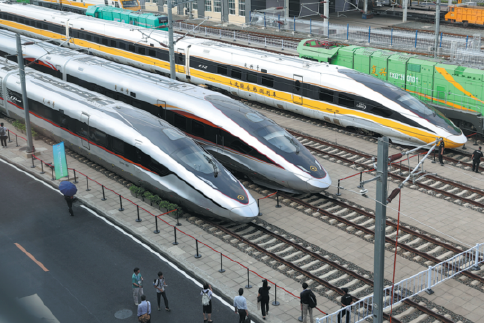Chinese film industry looks for new horizons in North America


LOS ANGELES - China's booming homegrown film industry is looking for new horizons as more Chinese films hit North America's theaters in 2019, and work to draw more US and Canadian moviegoers.
More Chinese films released in North America
The year of 2019 is another milestone for China's film industry as eight of the year's top 10 highest grossing films in the Chinese mainland's box office charts are Chinese films.
The Chinese mainland's box office hit an all-time high with a total of 63.7 billion yuan ($9.1 billion) as of Sunday. It remains a difficult task, however, for Chinese films to appeal to North American moviegoers and achieve similar success beyond national borders.
Nonetheless, there is reason to be hopeful. Two major Chinese-language film distributors in North America have fared much better in 2019 than last year.
CMC Pictures has successfully released 11 Chinese films this year with a North American cume of $10.66 million as of Saturday, including China's first homemade sci-fi blockbuster The Wandering Earth, which is the highest grossing Chinese film in North America in the last five years with a total of $5.87 million. It's a great leap for CMC Pictures, which released only five Chinese films in North America in 2018, which grossed a total of $727,000.
Another distributor, Well Go USA Entertainment, has released 14 Chinese-language films in 2019, doubling its North American box office from 2018's $4.01 million to $9.84 million as of Saturday. The company released only nine Chinese-language films last year.
The Chinese animated megahit, Ne Zha, was released by Well Go USA in North America with a cume of $3.67 million. It's the top-grossing animated film ever made by China and No 2 on the box office chart for all films ever screened on the Chinese mainland. The box office hit has grossed more than $700 million worldwide.
Over the last two decades, as China's film industry grows to its current prodigious size, Chinese filmmakers have been flooding top US film schools like USC, UCLA, NYU and AFI to learn Hollywood's secret sauce that has enabled Tinseltown to dominate the motion picture industry for the past 100 years.
Big challenge to be more popular
These Western-style film skill sets have translated into astonishing success for filmmakers in China's domestic market. But, to date, only around 7 percent of Chinese box office revenues come from overseas sales, in contrast to Hollywood films, whose foreign revenues have risen from 30 percent of sales 20 years ago to nearly 70 percent of box office revenues today.
The box office revenues of The Wandering Earth in North America are 0.8 percent of its global cume while the North American box office revenues of Ne Zha account for only 0.5 percent of its global cume.
It's worth noting that the majority of Chinese films box office revenues in North America are still derived from overseas Chinese moviegoers. Only a few moviegoers seeing Chinese films in North American theaters are non-Chinese speaking.
Chinese films have long faced an uphill, cross-cultural challenge to crack the code regarding what attracts international interest. Frequent complaints about Chinese fare range from "too different to identify with," or "too long, rambling and confusing," or simply "too Chinese."
The difference in stories and storytelling styles is significant, because Chinese films usually have a different format and pace than Hollywood's more popular three-act linear format, and stories unique to China are unfamiliar in the West.
Hollywood producer Jeff Most told Xinhua, "China has thousands of years of legends, folk tales and myths that the West knows nothing about and doesn't yet identify with the same way."
"These are rich cultural traditions China wants to share but they need to be introduced to Western audiences in a way that highlights the universal aspects of the story that everyone can all relate to, rather than the more nuanced cultural references that are impenetrable or confusing to Westerners," he said.
Chris McGurk, chairman and CEO of Cinedigm, which is a leading streaming and DVD distributor of Chinese content into the United States and US content into China, told Xinhua in an interview, "The biggest issue is storytelling. Traditional Chinese storytelling is very difficult for non-conditioned (foreign) viewers to feel comfortable with, especially if it's subtitled."
McGurk pointed out that a film with nuanced subtitling can mean greater success in the North American market. American audiences are notoriously opposed to reading subtitles and the dubbing on Chinese films has been poorly done for decades.
Some US audiences display a tendency to prefer watching characters on screen that look and behave like them, making it harder for movies with an all-Chinese cast to attract larger Western audiences, though Chinese or Chinese-American stars like Jackie Chan, Bruce Lee and Awkwafina have had no trouble being accepted by US audiences.
"A big challenge with Chinese films in global markets is in telling relatable stories," said Richard Yu, Cinema Escapist's Asia editor.
"For Western audiences, it's important for the main characters in stories to have serious and relatable struggles for them to experience a human connection," he added.
Better grasp of global audience tastes necessary
"I've long thought that there are a set of particular stigmas placed on Asian cinema, both by the Western critical establishment and by general audiences ... and these stigmas affect the potential of an Asian film's box office," said Sam C. Mac, a film critic for Slant Magazine, adding that some moviegoers still live with the legacy of an Asian cinema that made its way to the United States primarily on the strengths of genre entertainments, martial arts movies and Hong Kong gangster films.
"While it won't always be a winning formula, I think films that are earnest and honest in their expression of Chinese culture have a better chance at critical and audience acceptance than those that try to emulate Western formulas for cinema, and consider cultural identifiers as merely an afterthought," Mac told Xinhua.
"To some extent, Chinese capital being more involved will help increase the understanding of global cinematic tastes and the improvement of technical skills in production. Reaching global appeal for Chinese movies will require filmmakers to tell diverse stories with universal appeal," Anthony Kao, editor-in-chief of Cinema Escapist, told Xinhua.
"While joint productions with Hollywood and other global players will help the Chinese film industry better understand global audience tastes, investment alone is not the answer," he noted.
Some Hollywood insiders believe, with the rise of China's domestic market, for many Chinese filmmakers today, there is less incentive to gamble millions on an attempt to try to decipher the complexities of an unfamiliar and poorly-understood international market when their own familiar and well-understood domestic market can recoup hundreds of millions of dollars for a single hit film in China.
Andre Morgan, co-founder of Ruddy Morgan Films, told Xinhua, "The truth is that China has not focused on the American market, yet. Historically, the Chinese industry over the past 20 years has been very focused on rebuilding its domestic markets and production capabilities."
"They did not really make films for international consumption, but that will change as China consolidates its domestic market and looks for new horizons," Morgan added.
Su Jia, president of CMC Pictures, pointed out that the Chinese film industry is still at its embryonic phase, which will pave the way into the North American market.
"It will be a huge task for Chinese filmmakers to attract more mainstream audiences in North America in the future," said Su, noting that "at least, they are increasingly thinking about it."
- Domestic animated blockbuster <em>Ne Zha</em> to sail overseas
- Indie rockers soar with genre's rebirth
- From Belt and Road to silver screen: Cinema could be China's next big cultural export
- US China entertainment industry leaders to meet in NYC for closer cooperation
- Box office a hit in '17, taking in $8.6 billion




































